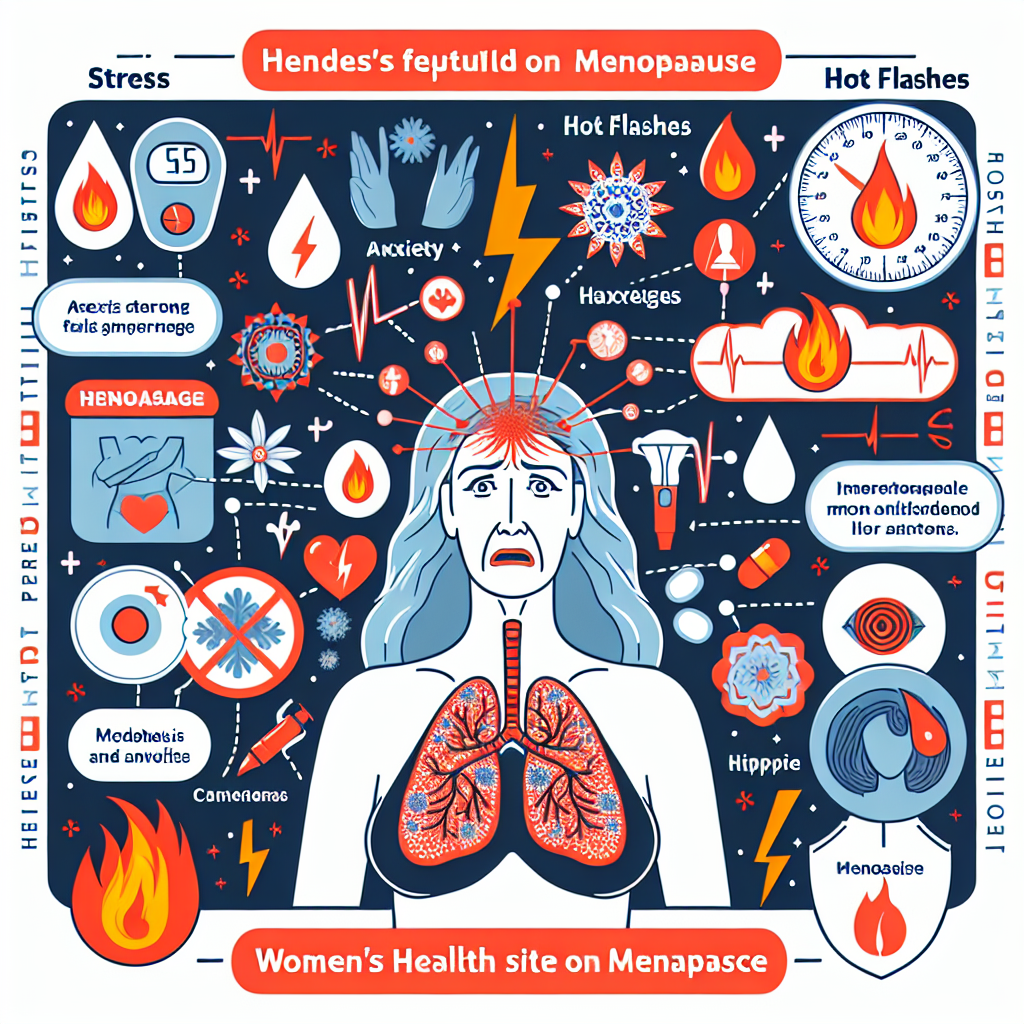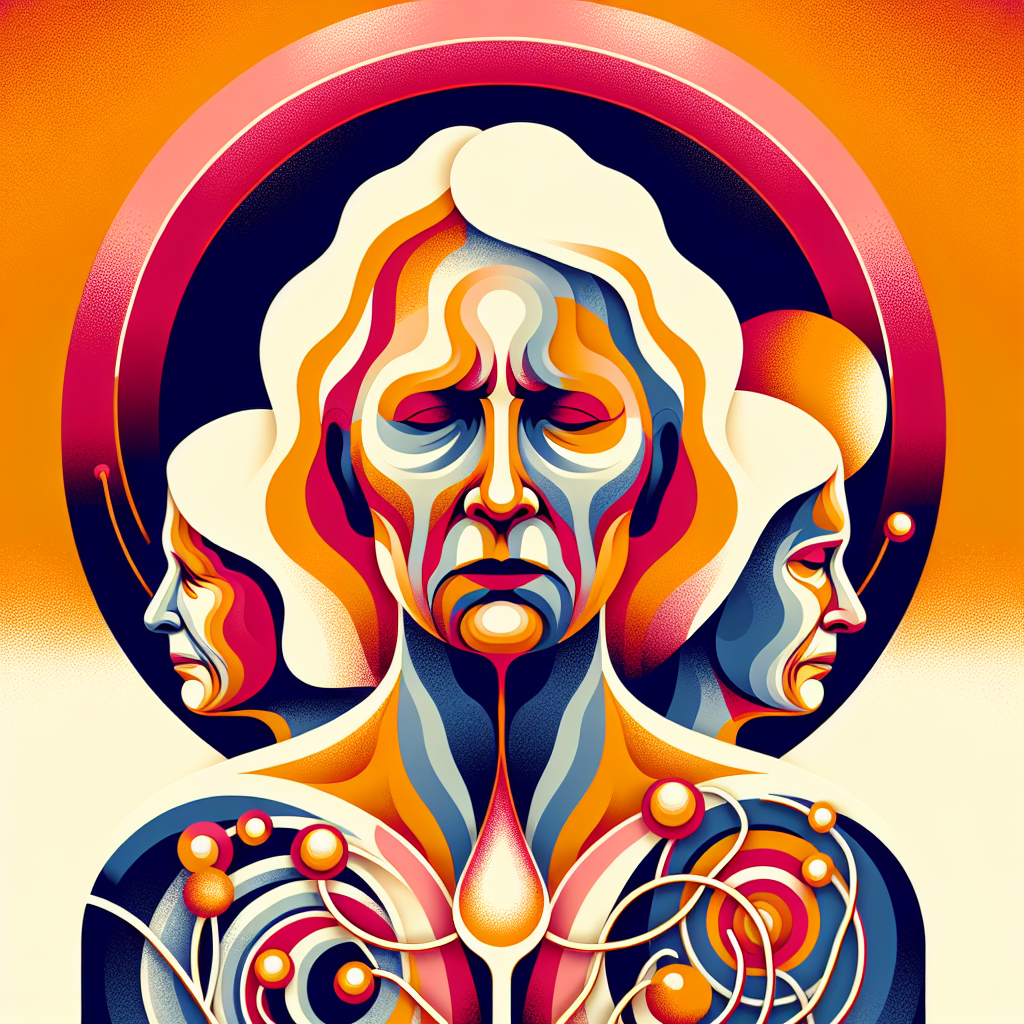
Managing the Triple Threat
Discover how to manage the triple threat of hot flashes, anxiety, and stress with practical strategies and a sprinkle of humor.
Understanding Your Body
Understand the biological connections, learn to decode your body’s signals, and find effective cooling techniques to keep your cool in any situation.
Take Control
Don't let these unwelcome visitors control your life!
Hot Flashes, Anxiety, and Stress: The Triple Threat and How to Cool Down Your Life
Picture this: You're in an important meeting, confidently making your point, when suddenly your face feels like it's been thrust into a furnace. Your carefully chosen blouse is now your worst enemy as sweat begins to form, and your train of thought derails completely. Sound familiar? If you're nodding in agreement, you've likely experienced the not-so-delightful trio of hot flashes, anxiety, and stress.
Let's face it, ladies – this trio doesn't exactly make for the best girl squad. But understanding the connection between hot flashes, anxiety, and stress can help you manage these unwelcome visitors more effectively. So grab your favorite cooling beverage, find a comfortable spot, and let's dive into this heated topic with a splash of humor and a whole lot of practical advice.
The Unholy Trinity: How Hot Flashes, Anxiety, and Stress Feed Each Other
Hot flashes, anxiety, and stress often operate like three mischievous friends who love to invite each other to the party. When one shows up, the others are usually not far behind. But why do they seem to travel as a package deal?
Dr. Louann Brizendine, neuropsychiatrist and author of "The Female Brain," explains that the hormonal fluctuations that trigger hot flashes can also affect the brain's stress response system. "The same hormonal changes that can cause hot flashes may also make women more vulnerable to stress and anxiety," she notes. "It's a biological connection that many women experience but don't fully understand."
Here's how this vicious cycle typically works:
- Hot flash arrives uninvited – Your body temperature suddenly spikes, causing you to feel flushed and sweaty.
- Anxiety joins the party – The physical discomfort and unpredictability of hot flashes can trigger anxiety, especially if they occur in social or professional settings.
- Stress completes the trio – Anxiety increases stress hormones, which can, in turn, trigger more hot flashes.
And round and round we go! Understanding this cycle is the first step toward breaking it.
The Science Behind the Sweat: What's Really Happening During Hot Flashes
Before we talk solutions, let's understand what's actually happening in your body when hot flashes, anxiety, and stress collide.
Hot flashes occur when blood vessels near the skin's surface dilate to cool off, creating that sudden feeling of heat and the subsequent sweating. While they're most commonly associated with menopause, hot flashes can also be triggered by anxiety and stress at any age.
According to research published in the Journal of Women's Health, up to 80% of women experience hot flashes during menopause, but they can also occur during perimenopause, which can begin as early as your 30s. The same study found that women with higher anxiety levels reported more frequent and severe hot flashes.
Dr. Rebecca Thurston, professor of psychiatry at the University of Pittsburgh, has conducted extensive research on the connection between hot flashes, anxiety, and stress. Her work suggests that psychological factors can both trigger hot flashes and make them feel more intense. "Women who are more anxious tend to be more aware of their bodily sensations and may perceive hot flashes as more severe," she explains.
Is It a Hot Flash or Anxiety? Decoding Your Body's Signals
Sometimes it can be difficult to determine whether you're experiencing a hot flash, an anxiety attack, or a stress response – especially since they often overlap. Here's a quick guide to help you decode what your body might be telling you:
Hot Flash Symptoms:
- Sudden intense warmth in your upper body and face
- Flushed skin and redness
- Sweating, especially in the upper body
- Heart palpitations
- Feeling chilled after the hot flash passes
Anxiety Symptoms:
- Feeling of dread or worry
- Restlessness or feeling on edge
- Increased heart rate
- Rapid breathing
- Difficulty concentrating
Stress Symptoms:
- Tension headaches
- Muscle tightness, especially in shoulders and neck
- Fatigue
- Irritability
- Sleep problems
When hot flashes, anxiety, and stress combine, you might experience a mix of these symptoms. The good news? Many of the management techniques work for all three conditions!
7 Cooling Strategies for Hot Flashes, Anxiety, and Stress
Now for the part you've been waiting for – how to manage this troublesome trio. Here are seven strategies that can help you keep your cool when hot flashes, anxiety, and stress threaten to heat things up:
1. Breathe Like You Mean It
Deep breathing isn't just for yoga class. When you feel a hot flash coming on or anxiety building, try the 4-7-8 breathing technique:
- Inhale quietly through your nose for 4 seconds
- Hold your breath for 7 seconds
- Exhale completely through your mouth for 8 seconds
- Repeat 3-4 times
This technique activates your parasympathetic nervous system (your body's "rest and digest" mode), which can help counteract the stress response that might be triggering your hot flashes and anxiety.
2. Dress for Success (and Coolness)
Layering isn't just a fashion statement – it's a hot flash management strategy! Wear light, breathable fabrics and dress in layers that you can remove when the heat strikes. Some companies now make cooling clothing specifically designed for women experiencing hot flashes.
"I keep a 'hot flash emergency kit' in my desk drawer," shares Maria, a 48-year-old marketing executive. "It includes a small portable fan, cooling wipes, and a lightweight cardigan that I can easily take off when a hot flash hits during a meeting."
3. Mind Your Diet
Certain foods and drinks can trigger hot flashes, anxiety, and stress. Common culprits include:
- Caffeine
- Alcohol
- Spicy foods
- Sugar
- Processed foods
Instead, focus on foods that support hormonal balance and reduce inflammation, such as:
- Fruits and vegetables
- Whole grains
- Lean proteins
- Healthy fats like avocados and olive oil
- Foods rich in phytoestrogens, like soy products and flaxseeds
A study published in Menopause: The Journal of The North American Menopause Society found that women who followed a Mediterranean diet reported fewer hot flashes and lower levels of anxiety and stress.
4. Move Your Body (But Keep It Cool)
Regular exercise is a powerful tool against hot flashes, anxiety, and stress. It helps regulate hormones, improves mood, and reduces stress. However, intense workouts can sometimes trigger hot flashes in susceptible women.
The solution? Opt for moderate exercise like:
- Swimming (bonus: you're already wet!)
- Walking, especially in the morning or evening when it's cooler
- Yoga or tai chi
- Dancing (turn up the fans and turn down the thermostat!)
5. Chill Out – Literally
Keep cooling products on hand for when hot flashes strike:
- Cooling neck wraps or bandanas
- Portable fans (including those cute little phone-attachable ones)
- Cooling pillows for nighttime hot flashes
- Facial mists stored in the refrigerator
"I keep a spray bottle of rose water in my purse," says Janelle, a 51-year-old teacher. "When I feel a hot flash coming on, I step out for a quick spritz. It cools me down and makes me smell nice – win-win!"
6. Stress-Proof Your Schedule
Since stress can trigger both hot flashes and anxiety, managing your daily stress levels is crucial:
- Build in buffer time between appointments
- Learn to say no to additional commitments when your plate is full
- Schedule regular "me time" for activities that help you relax
- Use technology to your advantage with reminder apps and calendar blocking
7. Consider Supplements and Herbs (With Your Doctor's Blessing)
Some women find relief from hot flashes, anxiety, and stress with natural supplements:
- Black cohosh
- Evening primrose oil
- Valerian root
- Magnesium
- B vitamins
Always consult with your healthcare provider before starting any supplement regimen, especially if you're taking other medications.
When to Seek Professional Help for Hot Flashes, Anxiety, and Stress
While lifestyle changes can make a significant difference in managing hot flashes, anxiety, and stress, sometimes professional help is needed. Consider talking to your healthcare provider if:
- Your hot flashes are severe or frequent enough to interfere with daily life
- You experience anxiety that feels overwhelming or unmanageable
- Your stress levels remain high despite your best efforts to reduce them
- You have thoughts of harming yourself or others
Dr. JoAnn Pinkerton, executive director of The North American Menopause Society, emphasizes that "women shouldn't suffer in silence. There are effective treatments available for hot flashes, anxiety, and stress that can significantly improve quality of life."
Treatment options might include:
- Hormone therapy (for menopausal hot flashes)
- Cognitive behavioral therapy
- Certain antidepressants that have been shown to reduce hot flashes
- Anti-anxiety medications
- Mindfulness-based stress reduction programs
Embracing Your Cool: Finding Humor in the Heat
Perhaps one of the most powerful tools for dealing with hot flashes, anxiety, and stress is maintaining your sense of humor. After all, if we can't laugh at ourselves occasionally glowing like human nightlights, what can we laugh at?
"I've started announcing my hot flashes before they're obvious," jokes Patricia, a 55-year-old accountant. "I just say, 'Stand back, everyone – I'm about to power the whole building with my personal heating system!' It breaks the tension and makes everyone laugh, including me."
Finding communities of women going through similar experiences can also help. Whether online or in person, sharing stories and coping strategies with others who understand can be incredibly validating and provide new ideas for managing your symptoms.
Cooling Conclusion: You've Got This!
Living with hot flashes, anxiety, and stress isn't exactly a walk in the park – unless that park has excellent shade and a cool breeze! But understanding the connection between these three conditions and having strategies to manage them can make a world of difference.
Remember that you're not alone in this experience. Millions of women navigate these waters every day, and many find that with the right approach, hot flashes, anxiety, and stress become manageable parts of life rather than controlling forces.
So the next time you feel that familiar warmth creeping up your neck, take a deep breath, reach for your cooling strategies, and remember – this too shall pass. And in the meantime, you might as well have a sense of humor about it. After all, how many people can say they're so hot they're practically on fire?
Stay cool, stay calm, and stay fabulous!
















